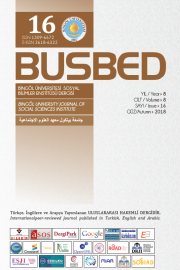KABUL SÜRECİNDE TÜRK MEDENİ KANUNU’NA YÖNELİK BAZI ELEŞTİRİLER
SOME CRITICISM OF TURKISH CIVIL CODE DURING ADMISSION PROCESS
Author(s): Erhan TaşbaşSubject(s): History of Law, Civil Law
Published by: Bingöl Üniversitesi Sosyal Bilimler Enstitüsü
Keywords: Turkish Civil Code; Revolution; Westernization; Criticism; Society;
Summary/Abstract: When revolutions were carried out in the field of law in the Republican Period, firstly a Civil Code was drafted. This effort, not considered revolutionary enough, was interrupted by the rulers of the period. In 1926 a revolutionary method was followed and translation of the whole Swiss Civil Code was decided on. Thus, translating the laws of another society was preferred rather than taking into account the experience and values of Turkish society. This has caused some criticism. While making legal reforms in Turkey depending on the Treaty of Lausanne, statutory advisors brought from Europe were benefited and this has brought about the claims that concession and commitment were offered to European states in the Treaty of Lausanne. As the Turkish Civil Code (TMK) was translated only by a commission consisting of jurists, the social, cultural and economic aspects were not discussed in detail. The text of the translation was accepted collectively without consideration of the articles one by one in the Grand National Assembly of Turkey (TBMM).The language used in Turkish Civil Code had a lot of Arabic and Persian words and errors were observed in translation.
Journal: Bingöl Üniversitesi Sosyal Bilimler Enstitüsü Dergisi (BUSBED)
- Issue Year: 8/2018
- Issue No: 16
- Page Range: 650-671
- Page Count: 22
- Language: Turkish

